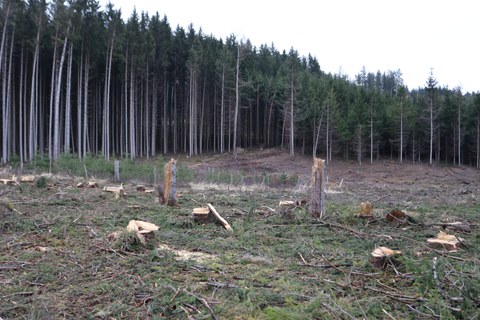Feb 08, 2024
Living lab for sustainable forestry: How forest management works in times of climate change
The forests in Germany and Europe are under immense pressure: Climate change is reducing their resilience and is increasingly threatening ecosystems. This phenomenon is also having an impact on forestry yields, as demand for wood products increases. In the joint LabForest project, researchers from TUD Dresden University of Technology (TUD), Ludwig-Maximilians-Universität München (LMU) and Technical University of Munich (TUM) are investigating how forestry can thrive in times of climate change. To this end, the joint project will receive funding of EUR 2.8 million from the German Federal Ministry of Education and Research (BMBF) over the next five years.
LabForest is investigating future options for forest management in the conflicting areas of climate change, economic interests, nature conservation and hydrology. The project partners will create a living lab for comprehensive experiments and measurements in the LMU's university forest near Landshut. The aim is for the research results to be put into practical application in the German forestry and timber industry.
The joint project is interdisciplinary. The researchers will explore various components of the forest and their interactions in conjunction with different management options: the water cycle, biodiversity, carbon fixation, wood production and pests such as the bark beetle. For this purpose, they will collect measurement data on site and use it to create complex models for hydrology, vegetation, economics and life cycle assessment.
TU Dresden is involved with the Chair of Forest Zoology. The team from Tharandt is researching the role of animals in forest ecosystems as a basis for sustainable forest management concepts and evidence-based nature conservation. Within the project, the Chair is responsible for the "Biodiversity" work package. The task is to quantify the interactions between forest management and biodiversity so that they can be taken into account in management decisions.
"Biodiversity is an integral component and essential for the functions of forests," emphasizes Prof. Sebastian Seibold, Chair of Forest Zoology. "It is therefore imperative that the effects that forest conversion measures have on biodiversity are taken into account when evaluating the different options."
The researchers' investigations focus primarily on two aspects: On the one hand, on the effects of forest management on the biodiversity of plants, fungi and insects. On the other hand, on how insects and game influence forest regeneration via herbivory and browsing, depending on different forest management strategies. The researchers will carry out comprehensive surveys and measure browsing rates. The results are intended to provide the basis for a nature conservation assessment of the management measures.
In order to ensure that the research results can be used directly in forestry and when training new specialists, the universities in Dresden and Munich are joined by knowledge transfer partners and practitioners such as the Bavarian State Institute for Forestry (LWF), the Bavarian Forest Farming School Bayerische Waldbauernschule, and the Forestry Office Gräflich Arco-Zinneberg'sche Forstamt. Its members are confident that their work can prepare the forest for the challenges ahead. "LabForest will contribute significantly to achieving the climate targets and to preserve and sustainably use habitats and resources," says Lukas Lehnert from LMU, the head of LabForest. According to him, the project is developing future concepts for the sustainable management of forests and for coping with crises and extreme events.
Contact:
Prof. Sebastian Seibold
Tel.: +49 351 463-31376

